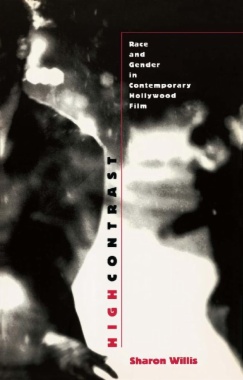In High Contrast, Sharon Willis examines the dynamic relationships between racial and sexual difference in Hollywood film from the 1980s and 1990s. Seizing on the way these differences are accentuated, sensationalized, and eroticized on screen—most often with little apparent regard for the political context in which they operate—Willis restores that context through close readings of a range of movies from cinematic blockbusters to the work of the new auteurs, Spike Lee, David Lynch, and Quentin Tarantino.
Capturing the political complexity of these films, Willis argues that race, gender, and sexuality, as they are figured in the fantasy of popular film, do not function separately, but rather inform and determine each other’s meaning. She demonstrates how collective anxieties regarding social difference are mapped onto big budget movies like the Die Hard and Lethal Weapon series, Basic Instinct, Fatal Attraction, Thelma and Louise, Terminator 2, and others. Analyzing the artistic styles of directors Lynch, Tarantino, and Lee, in such films as Wild at Heart, Pulp Fiction, and Do the Right Thing, she investigates how these interactions of difference are linked to the production of specific authorial styles, and how race functions for each of these directors, particularly in relation to gender identity, erotics, and fantasy.
- Contents
- Acknowledgments
- Introduction
- Part I. Battles of the Sexes
- 1. Mutilated Masculinities and Their Prostheses: Die Hards and Lethal Weapons
- 2. Insides Out: Public and Private Exchanges from Fatal Attraction to Basic Instinct
- 3. Combative Femininity: Thelma and Louise and Terminator 2
- Part II. Ethnographies of the "White" Gaze
- 4. Do the Wrong Thing: David Lynch's Perverse Style
- 5. Tell the Right Story: Spike Lee and the Politics of Representative Style
- 6. Borrowed "Style": Quentin Tarantino's Figures of Masculinity
- Notes
- Index

